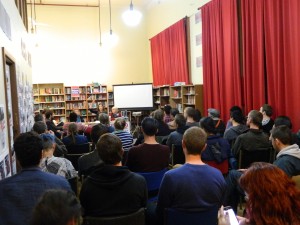
Michele O’Neil, secretary of the Textiles, Clothing and Footwear Union of Australia and Liz Ross, a veteran labour rights campaigner, address the audience during the meeting at Trades Hall (Picture: Sham Majid)
The thorny issue of sweatshop labour continues to reverberate around the garment industry despite the collapse of a massive Bangladeshi textile factory that killed more than 1,100 workers in April this year.
While the devastation surrounding the Rana Plaza disaster resulted in global textile and garment industry conglomerates embarking on several initiatives to impose more stringent labour rights and practices, sweatshop labour in textile industries around the world is still rampant.
A panel and group discussion meeting on the recent Bangladesh textile industry disaster and labour practices of the global garment industry was held at Trades Hall on September 12, 2013.
Organized by the Socialist Alternative, the meeting specifically focussed on how the spirit of unionism can help prevent such atrocities from happening around the world and how the textile industries in impoverished countries are being exploited by global fashion brands.
Read how efforts to provide compensation for the Rana Plaza victims are stuck in a deadlock.
Watch exclusive footage of the Rana Plaza collapse (Video courtesy of www.somoynews.tv)
Michele O’Neil, Textiles, Clothing and Footwear Union of Australia Secretary and one of the panel speakers, said global media attention in the aftermath of the Bangladeshi building collapse had highlighted dire labour practices.
“The international community can do more, and the clothes that Bangladesh makes are for international companies,” said Ms O’Neil.
“They have a very powerful role in pressuring multinational corporations and organizations to improve their labour practices, especially in some of the most poorest countries in the world.”
Liz Ross, a veteran union activist and Socialist Alternative member, says the Bangladeshi building collapse will not result in an immediate improvement of textile labour practices.
“This is very much an ongoing process and the incident is just shedding a little light on a huge problem,” said Ms Ross.
“There is no immediate solution and opposition from companies and governments mean they are still charging the lowest cost and looking at profits and this is where you are going to get problems.”
Ms Ross said the bottom line is the root of the problem.
“The dollar is the ultimate measure of everything,” she said.
“Companies might sign on to observe various codes of conduct but it does not mean they will abide by it.
“The only way they will abide is when unions take strong action against these companies.”
Steven Chang, a researcher at Melbourne University who attended the forum, said the notions of consumerism and capitalism were powerful forces at play that resulted in the tragic Bangladeshi building collapse.
“The event is best described as an entirely preventable industrial murder,” said Mr Chang.
“These companies knew exactly what they were doing and it was a conscious destruction of peoples’ live for corporate profit.”
Chad O’Connor, who works in the finance industry, said the building collapse should serve as a wake-up call for the international garment and textile industry.
“More can be done to rally the international community on global labour practices but whether they will be done is another question altogether,” said Mr O’Connor.
“There are so many forces and stakeholders pushing against each other and trying to protect the status quo so it would really take a large effort to eradicate such labour practices.”
Melanie Mayze, a nurse, said consumers should be more aware of the underlying labour practices underpinning the clothes that are being sold at retail outlets.
“We all buy clothes so it is important to know more about what price other people pay for us to buy and wear them,” said Ms Mayze.
“In order to combat poor labour standards, you have to get to the people at the top to emulate the same practices and pay their own workers properly and it is all about leading and taking a stand.”
Jade Eckhaus, an Arts student at Melbourne University and a member of the Socialist Alternative, said such meetings give people a platform to hold passionate discussions and debates on issues that matter to them.
“It is really important to give like-minded people a forum to talk and air their views,” said Ms Eckhaus.
“Engaging in activism shows people are sharing a common bond on issues that mean a lot to them.”
